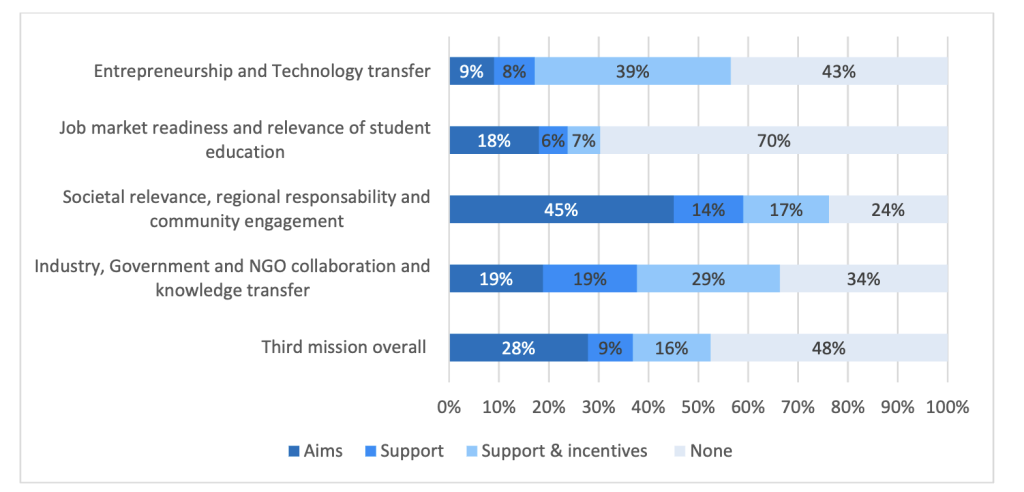In the dynamic landscape of academia, the concept of the Third Mission has emerged as a pivotal force, driving universities to extend their impact beyond traditional education and research. Recently, our META Group experts, Andrea Di Anselmo and Antonello Fiorucci, travelled to Northern Italy to deliver a workshop on the influence of the Third Mission at the University of Padua.
The Third Mission of universities involves activities aimed at transferring the results of academic endeavours into tangible benefits for local and regional environments. It serves as a crucial avenue for universities to showcase the value of knowledge in human development, going beyond the traditional roles of education and research. The economic value generated through Third Mission activities is a testament to its significance in fostering innovation and engagement.
Bridging a gap
The Third Mission is deeply intertwined with the territory it serves. It focuses on transferring technologies from laboratories to the public, managing intellectual property, facilitating technology transfers to companies, and fostering the creation of spin-offs. Additionally, public engagement and connection with social ecosystems play a vital role in the success of the Third Mission, emphasising its role in bridging the gap between academia and society.
According to a study conducted by PROMISE (1) among 122 European Higher Education Institutions (HEIs), at least 90% of them included Third Mission in their main strategic documents and policies. They also divided the policies related to it into subcategories: Entrepreneurship and Technology transfer, Job market readiness and relevance of student education, Societal relevance, regional responsibility, and community engagement, Industry, Government and NGO collaboration and knowledge transfer, and Third Mission overall. The following graphic highlights how HEIs approach Third Mission, with a focus on establishing aims, supporting Third Mission work, or a combination of both.

As it shows, “Societal relevance, regional responsibility and community engagement” is a policy area with 76% of institutions having policies and providing aims, support, or support and incentives. It suggests a shared commitment among these institutions to actively contribute to the well-being and development of their surrounding communities and regions, aligning with broader societal needs and responsibilities, which is core to the spirit behind the Third Mission itself.
META’s action in Padua
Through a three-step competence building action, META Group empowered the Third Mission Office of the university of Padua, further solidifying its position as a leader in impact mobilisation. The workshop, attended by representatives from various departments, underscored the necessity of a unified approach to the Third Mission. It provided a platform for sharing insights and strategies to maximise the impact of universities in their broader communities. “Working across Europe we had the opportunity to meet with many people working on third mission and we learned a lot about challenges and solutions. When we are asked to help, we share this experience, which is not so common”, highlights Andrea Di Anselmo, President of META Group.
We help them understand how to make things happen and provide a logic framework but also operational hints and tools.
The Third mission, a booster for innovation
In the heterogeneous landscape of academia, there is no standard recipe for success; however, two fundamental principles apply universally. Firstly, collaborative teamwork is essential, and if universities fail to cultivate a multidisciplinary approach, success becomes elusive. Secondly, the emphasis should be on need-oriented activities rather than being solution-driven.
In this context, it is crucial to recognise that technology is not the primary driver; instead, the focus should be on addressing the problems at hand. As universities navigate this evolving terrain, the Third Mission emerges as a guiding light of innovation, collaboration, and success. European universities, in particular, are embracing this mission, positioning themselves to shape the future and drive societal progress by effectively leveraging knowledge.
Read more about the Third Mission:
- Compagnucci, F, Spigarelli, The Third Mission of the university: A systematic literature review on potentials and constraints, Technological Forecasting and Social Change, Volume 161, December 2020. Available here.
- Elena Pérez, S., Arregui Pabollet, E. and Marinelli, E., The role of universities in regional development through Smart Specialisation Strategies: Evidence from two Spanish regions (Catalonia and Navarre), 2017, ISSN 0213-3865, (92), p. 43-67, JRC108598. Available here.
(1) PROMISE is the Platform for the Support of Responsibility and Openness and their Monitoring in Innovation and Science Ecosystems. It was developed by the EU funded research project SUPER MoRRI.

